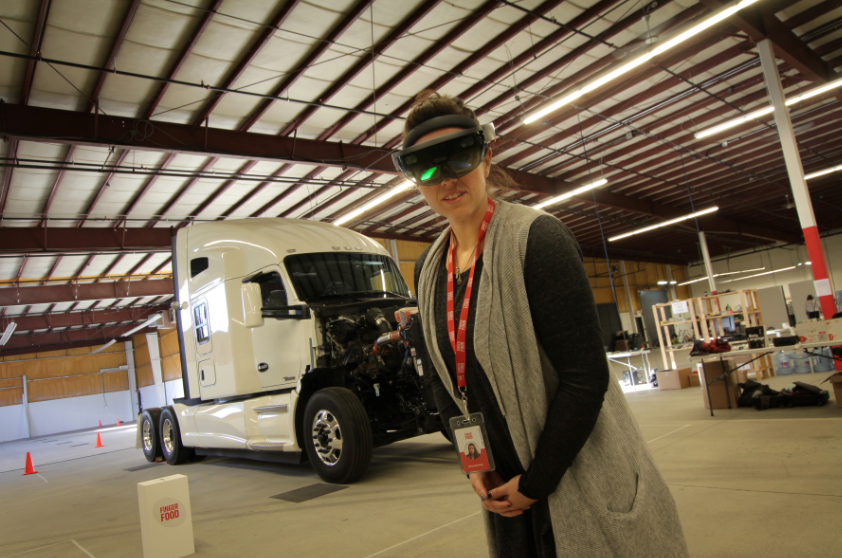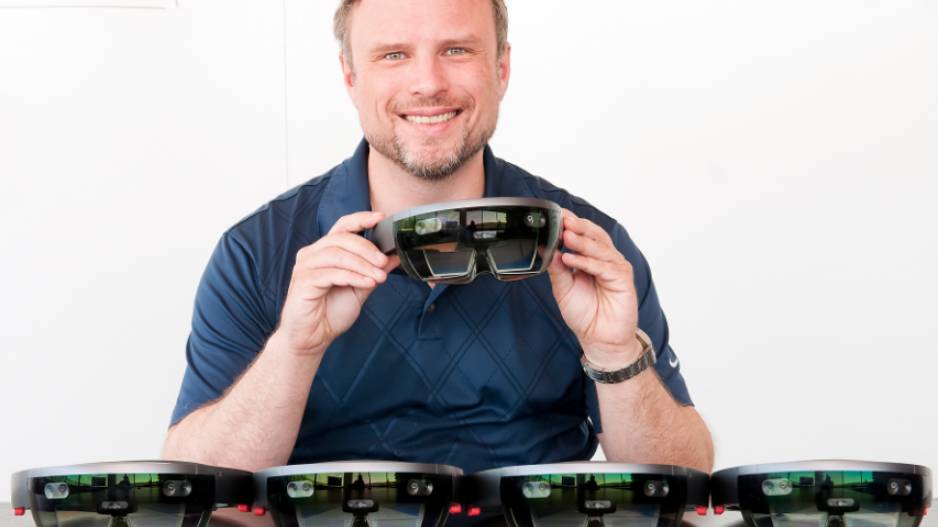Ryan Peterson’s workday was especially crammed during a September technology summit in Vancouver where notable names from the Cascadia tech corridor had gathered inside a ballroom for a lunch.
The conference agenda was already packed with panels, and Peterson still had meetings on the docket with high-level tech executives fascinated by what his Port Coquitlam startup was doing with the Microsoft (Nasdaq:MSFT) HoloLens.
That busy day began taking a turn for the surreal when Microsoft CEO Satya Nadella walked up on stage and, in front of all the attendees, championed the innovations emerging from Peterson’s Finger Food Studios. A few steps away sat Microsoft co-founder Bill Gates, who was preparing for a fireside chat with Nadella.
“It’s 20 years of work to be an overnight success,” said Peterson, CEO of the company he co-founded five years ago with business partner Trent Shumay.
On December 9, Finger Food Studios unveiled its 26,000-square-foot “Holodeck” at a converted Port Coquitlam warehouse.
The $1 million investment in the new facility, Peterson said, will allow his start-up to showcase the advantage in “knowledge arbitrage” it holds over others in the industry. When users don the HoloLens augmented-reality headset inside the Holodeck facility, giant objects like semi-trailer trucks can appear as life-size holograms in front of users’ eyes – radically transforming the process by which large-scale industrial projects such as vehicle redesigns are conceived and executed.
While Finger Food Studios specializes in holograms, beacons and the Internet of Things, Peterson originally planned to take over his stepfather’s construction business.
But a testicular cancer diagnosis at age 19 sidelined him as an ironworker on Vancouver Island.
Peterson enrolled in computer science and sociology courses at Camosun College in Victoria before quickly dropping out to launch his own startup specializing in website services.
While he credits his stepfather for his entrepreneurial spirit, it was his father, Dan Peterson, a Social Credit MLA during the Bill Vander Zalm era, who showed him the sacrifices necessary to pursue a career he was passionate about.
So when the dot-com bubble burst in 2001 and Peterson’s first startup folded, he ventured south to the Silicon Valley to pursue work in the tech industry for the next decade.
Half that time was spent in San Francisco.
He then worked remotely on Vancouver Island for the remainder before he and Shumay launched Finger Food Studios in the Lower Mainland five years ago.
“Tech is moving so quickly that you have to pivot yourself, your business, what you know every year. So think about our business: what we were doing five years ago is not what we’re doing today,” Peterson said.
While Finger Food Studios has a business plan for 2016-18, the CEO admitted the plan for that final year is just one page long:
“It says, ‘Pivot on the next technology,’” Peterson said. “I don’t have a grand vision. We’re just very curious and we try to stay on top, riding the crest of the wave of the tech.”

Finger Food Studios associate creative director Kelsey Bowman demonstrates Microsoft's HoloLens at the tech company's new Holodeck facility, which was unveiled December 9 following a $1-million investment | Photo credit: Rob Kruyt
That business mindset didn’t truly wash over the CEO until just after his 30th birthday, when doctors diagnosed him with cancer for a second time.
Doctors initially told him the cancer was spreading and was incurable. But further tests revealed it had not spread and doctors successfully removed a massive tumor.
“From then on I planned to have no regrets in life.”
It’s worked so far, according to Peterson, who said the privately held company has never lost money and its 2016 run rate is pegged at $20 million, up from $380,000 in revenue five years ago.
The company’s revenue even tripled over the last two-plus years, at the same time he and his wife, a former Olympic fencer, welcomed twin boys into their lives.
“The single entrepreneur that works 100 hours a week – I just think is [expletive]. … It’s just the worst,” Peterson said.
He added that Finger Food Studios has grown rapidly with the staff usually logging 40-hour workweeks.
“You can live a balanced lifestyle and have a family and do everything you want to accomplish and you can do that by working normal hours.”
@reporton



